Financial Accounting Report: Non-Financial Information Disclosure
VerifiedAdded on 2022/11/17
|11
|2792
|285
Report
AI Summary
This report delves into the realm of non-financial information, examining its nature and economic consequences within the context of financial accounting. It explores how businesses disclose non-financial data related to their social, economic, and environmental performance, including CSR and ESG reporting. The report analyzes the economic impact of such disclosures, including their influence on earning potential, stock prices, and the cost of capital. Furthermore, it discusses various non-financial information disclosure methods, such as integrated reporting, the use of PRI and SASB frameworks, and the role of organizations like CDP and GRI. The report highlights the importance of non-financial information for stakeholders, investors, and the overall sustainability of business operations. The report concludes by emphasizing the need for a globally accepted sustainability reporting framework to provide reliable and relevant information.

Advance Financial Accounting
1
1
Paraphrase This Document
Need a fresh take? Get an instant paraphrase of this document with our AI Paraphraser
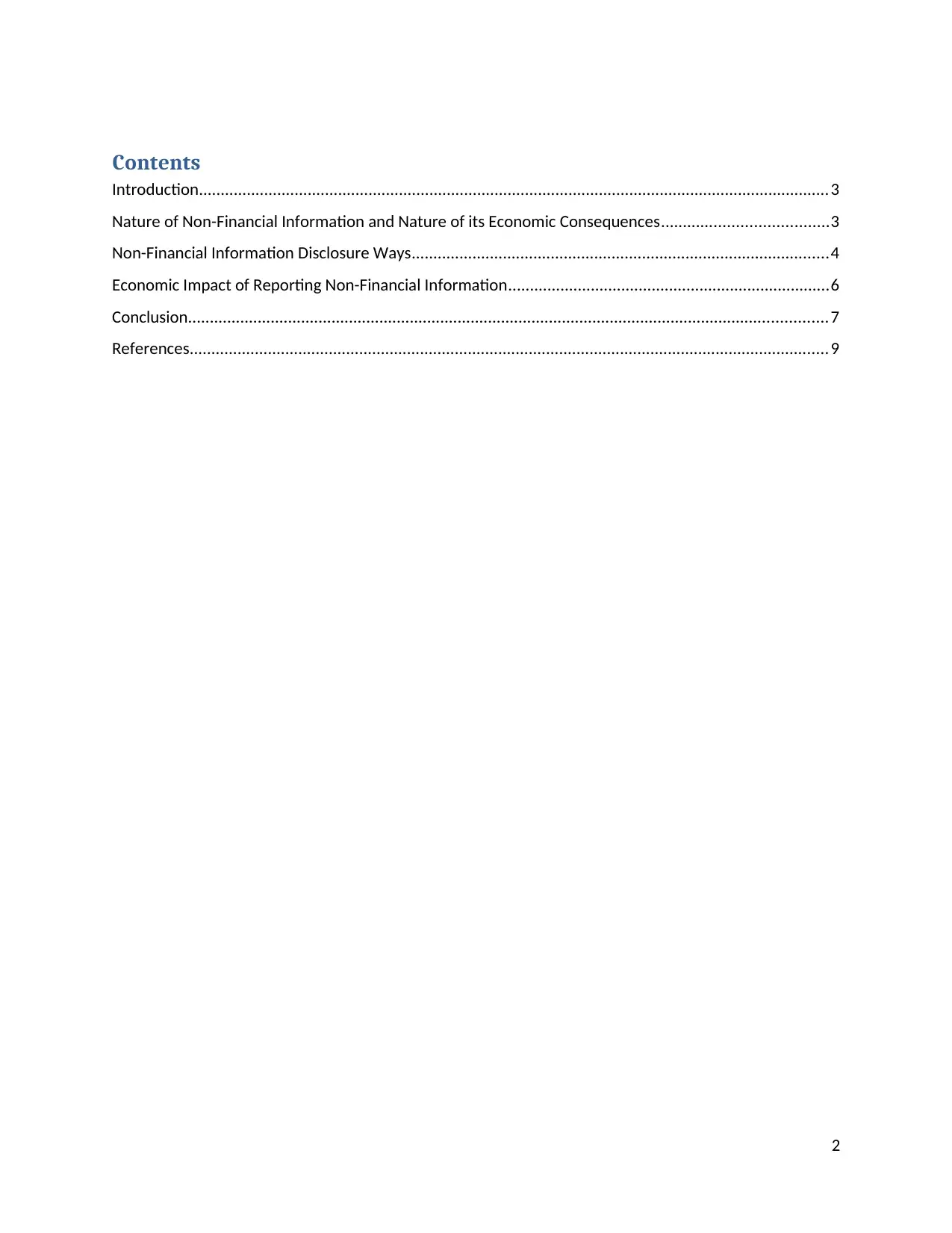
Contents
Introduction.................................................................................................................................................3
Nature of Non-Financial Information and Nature of its Economic Consequences......................................3
Non-Financial Information Disclosure Ways................................................................................................4
Economic Impact of Reporting Non-Financial Information..........................................................................6
Conclusion...................................................................................................................................................7
References...................................................................................................................................................9
2
Introduction.................................................................................................................................................3
Nature of Non-Financial Information and Nature of its Economic Consequences......................................3
Non-Financial Information Disclosure Ways................................................................................................4
Economic Impact of Reporting Non-Financial Information..........................................................................6
Conclusion...................................................................................................................................................7
References...................................................................................................................................................9
2
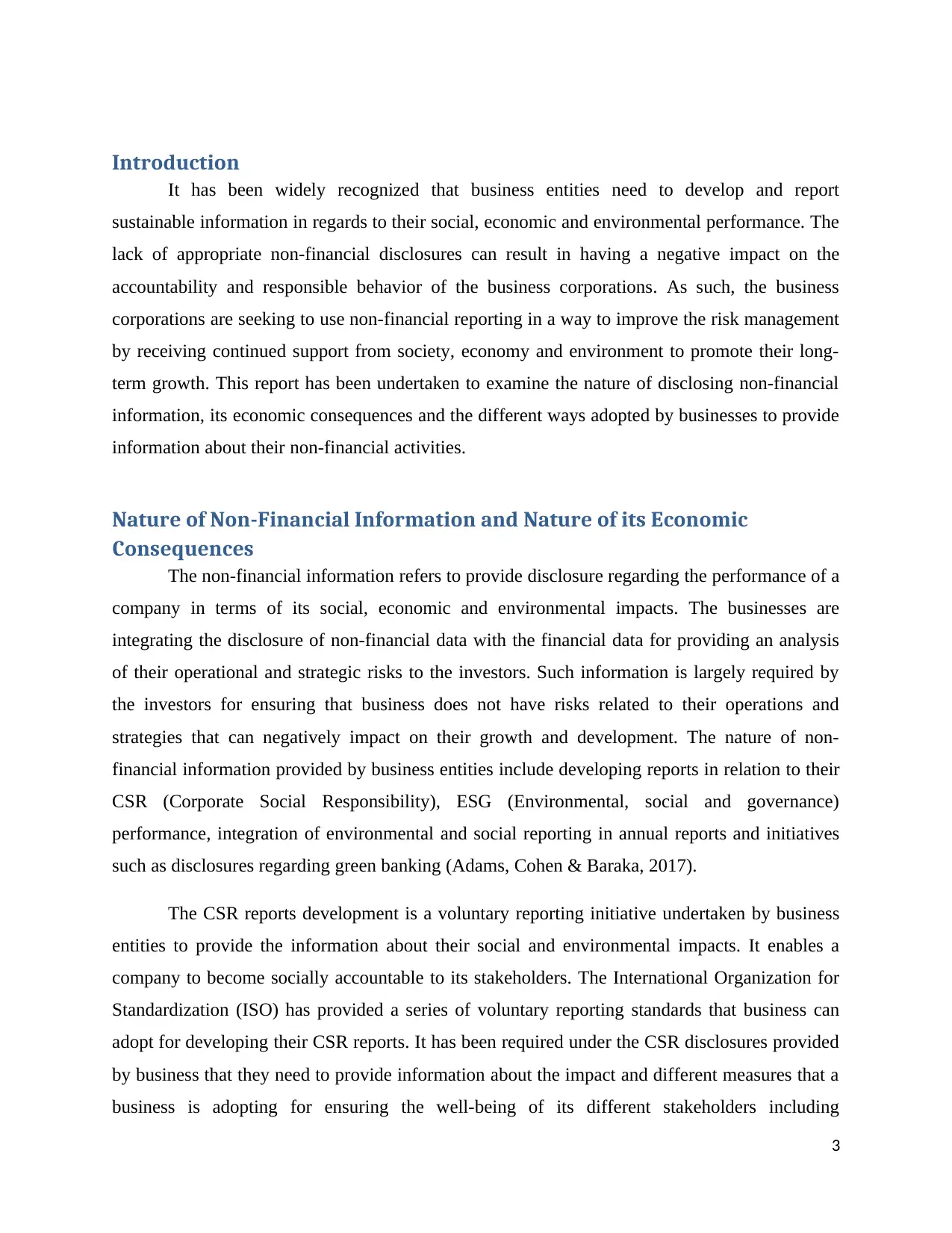
Introduction
It has been widely recognized that business entities need to develop and report
sustainable information in regards to their social, economic and environmental performance. The
lack of appropriate non-financial disclosures can result in having a negative impact on the
accountability and responsible behavior of the business corporations. As such, the business
corporations are seeking to use non-financial reporting in a way to improve the risk management
by receiving continued support from society, economy and environment to promote their long-
term growth. This report has been undertaken to examine the nature of disclosing non-financial
information, its economic consequences and the different ways adopted by businesses to provide
information about their non-financial activities.
Nature of Non-Financial Information and Nature of its Economic
Consequences
The non-financial information refers to provide disclosure regarding the performance of a
company in terms of its social, economic and environmental impacts. The businesses are
integrating the disclosure of non-financial data with the financial data for providing an analysis
of their operational and strategic risks to the investors. Such information is largely required by
the investors for ensuring that business does not have risks related to their operations and
strategies that can negatively impact on their growth and development. The nature of non-
financial information provided by business entities include developing reports in relation to their
CSR (Corporate Social Responsibility), ESG (Environmental, social and governance)
performance, integration of environmental and social reporting in annual reports and initiatives
such as disclosures regarding green banking (Adams, Cohen & Baraka, 2017).
The CSR reports development is a voluntary reporting initiative undertaken by business
entities to provide the information about their social and environmental impacts. It enables a
company to become socially accountable to its stakeholders. The International Organization for
Standardization (ISO) has provided a series of voluntary reporting standards that business can
adopt for developing their CSR reports. It has been required under the CSR disclosures provided
by business that they need to provide information about the impact and different measures that a
business is adopting for ensuring the well-being of its different stakeholders including
3
It has been widely recognized that business entities need to develop and report
sustainable information in regards to their social, economic and environmental performance. The
lack of appropriate non-financial disclosures can result in having a negative impact on the
accountability and responsible behavior of the business corporations. As such, the business
corporations are seeking to use non-financial reporting in a way to improve the risk management
by receiving continued support from society, economy and environment to promote their long-
term growth. This report has been undertaken to examine the nature of disclosing non-financial
information, its economic consequences and the different ways adopted by businesses to provide
information about their non-financial activities.
Nature of Non-Financial Information and Nature of its Economic
Consequences
The non-financial information refers to provide disclosure regarding the performance of a
company in terms of its social, economic and environmental impacts. The businesses are
integrating the disclosure of non-financial data with the financial data for providing an analysis
of their operational and strategic risks to the investors. Such information is largely required by
the investors for ensuring that business does not have risks related to their operations and
strategies that can negatively impact on their growth and development. The nature of non-
financial information provided by business entities include developing reports in relation to their
CSR (Corporate Social Responsibility), ESG (Environmental, social and governance)
performance, integration of environmental and social reporting in annual reports and initiatives
such as disclosures regarding green banking (Adams, Cohen & Baraka, 2017).
The CSR reports development is a voluntary reporting initiative undertaken by business
entities to provide the information about their social and environmental impacts. It enables a
company to become socially accountable to its stakeholders. The International Organization for
Standardization (ISO) has provided a series of voluntary reporting standards that business can
adopt for developing their CSR reports. It has been required under the CSR disclosures provided
by business that they need to provide information about the impact and different measures that a
business is adopting for ensuring the well-being of its different stakeholders including
3
⊘ This is a preview!⊘
Do you want full access?
Subscribe today to unlock all pages.

Trusted by 1+ million students worldwide
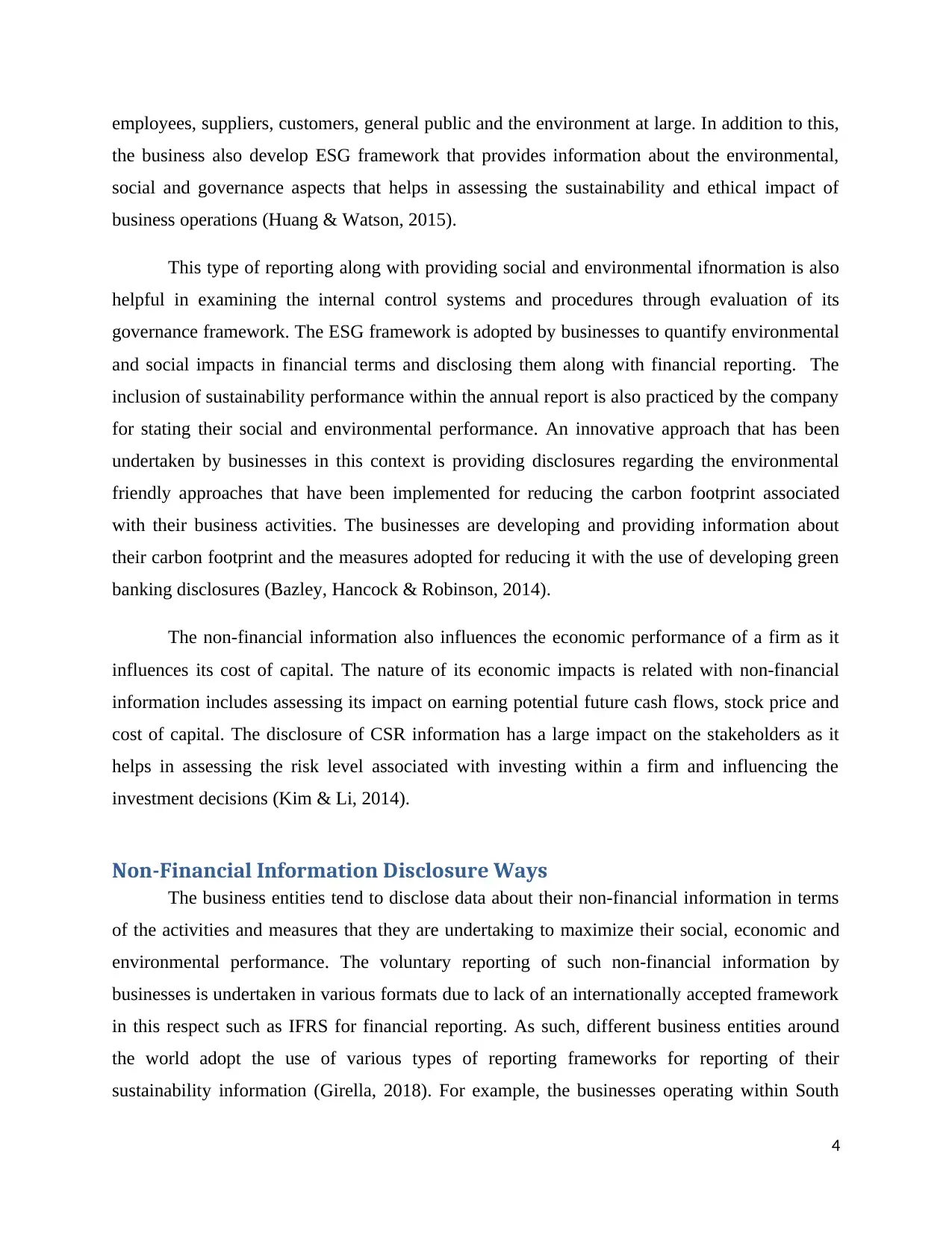
employees, suppliers, customers, general public and the environment at large. In addition to this,
the business also develop ESG framework that provides information about the environmental,
social and governance aspects that helps in assessing the sustainability and ethical impact of
business operations (Huang & Watson, 2015).
This type of reporting along with providing social and environmental ifnormation is also
helpful in examining the internal control systems and procedures through evaluation of its
governance framework. The ESG framework is adopted by businesses to quantify environmental
and social impacts in financial terms and disclosing them along with financial reporting. The
inclusion of sustainability performance within the annual report is also practiced by the company
for stating their social and environmental performance. An innovative approach that has been
undertaken by businesses in this context is providing disclosures regarding the environmental
friendly approaches that have been implemented for reducing the carbon footprint associated
with their business activities. The businesses are developing and providing information about
their carbon footprint and the measures adopted for reducing it with the use of developing green
banking disclosures (Bazley, Hancock & Robinson, 2014).
The non-financial information also influences the economic performance of a firm as it
influences its cost of capital. The nature of its economic impacts is related with non-financial
information includes assessing its impact on earning potential future cash flows, stock price and
cost of capital. The disclosure of CSR information has a large impact on the stakeholders as it
helps in assessing the risk level associated with investing within a firm and influencing the
investment decisions (Kim & Li, 2014).
Non-Financial Information Disclosure Ways
The business entities tend to disclose data about their non-financial information in terms
of the activities and measures that they are undertaking to maximize their social, economic and
environmental performance. The voluntary reporting of such non-financial information by
businesses is undertaken in various formats due to lack of an internationally accepted framework
in this respect such as IFRS for financial reporting. As such, different business entities around
the world adopt the use of various types of reporting frameworks for reporting of their
sustainability information (Girella, 2018). For example, the businesses operating within South
4
the business also develop ESG framework that provides information about the environmental,
social and governance aspects that helps in assessing the sustainability and ethical impact of
business operations (Huang & Watson, 2015).
This type of reporting along with providing social and environmental ifnormation is also
helpful in examining the internal control systems and procedures through evaluation of its
governance framework. The ESG framework is adopted by businesses to quantify environmental
and social impacts in financial terms and disclosing them along with financial reporting. The
inclusion of sustainability performance within the annual report is also practiced by the company
for stating their social and environmental performance. An innovative approach that has been
undertaken by businesses in this context is providing disclosures regarding the environmental
friendly approaches that have been implemented for reducing the carbon footprint associated
with their business activities. The businesses are developing and providing information about
their carbon footprint and the measures adopted for reducing it with the use of developing green
banking disclosures (Bazley, Hancock & Robinson, 2014).
The non-financial information also influences the economic performance of a firm as it
influences its cost of capital. The nature of its economic impacts is related with non-financial
information includes assessing its impact on earning potential future cash flows, stock price and
cost of capital. The disclosure of CSR information has a large impact on the stakeholders as it
helps in assessing the risk level associated with investing within a firm and influencing the
investment decisions (Kim & Li, 2014).
Non-Financial Information Disclosure Ways
The business entities tend to disclose data about their non-financial information in terms
of the activities and measures that they are undertaking to maximize their social, economic and
environmental performance. The voluntary reporting of such non-financial information by
businesses is undertaken in various formats due to lack of an internationally accepted framework
in this respect such as IFRS for financial reporting. As such, different business entities around
the world adopt the use of various types of reporting frameworks for reporting of their
sustainability information (Girella, 2018). For example, the businesses operating within South
4
Paraphrase This Document
Need a fresh take? Get an instant paraphrase of this document with our AI Paraphraser
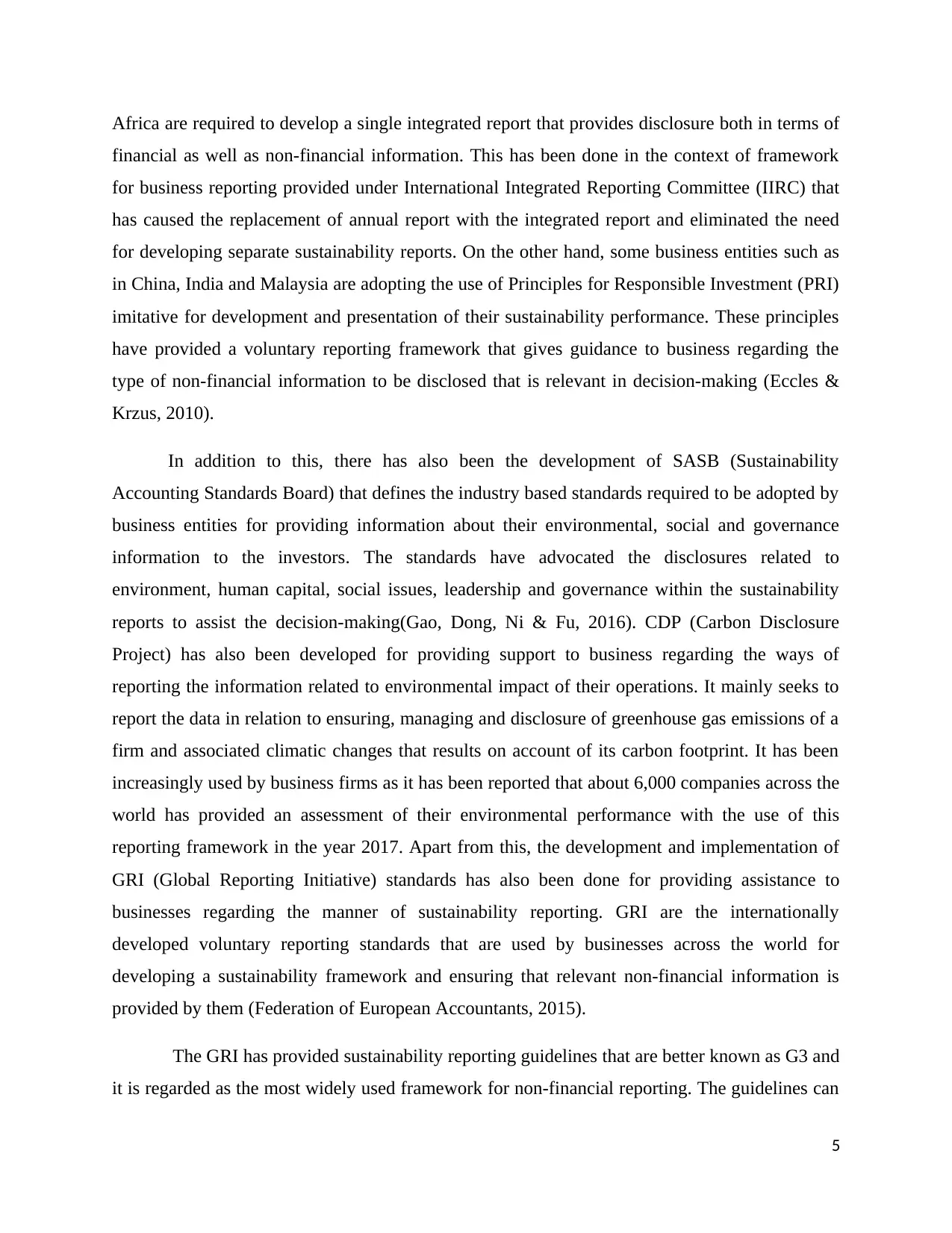
Africa are required to develop a single integrated report that provides disclosure both in terms of
financial as well as non-financial information. This has been done in the context of framework
for business reporting provided under International Integrated Reporting Committee (IIRC) that
has caused the replacement of annual report with the integrated report and eliminated the need
for developing separate sustainability reports. On the other hand, some business entities such as
in China, India and Malaysia are adopting the use of Principles for Responsible Investment (PRI)
imitative for development and presentation of their sustainability performance. These principles
have provided a voluntary reporting framework that gives guidance to business regarding the
type of non-financial information to be disclosed that is relevant in decision-making (Eccles &
Krzus, 2010).
In addition to this, there has also been the development of SASB (Sustainability
Accounting Standards Board) that defines the industry based standards required to be adopted by
business entities for providing information about their environmental, social and governance
information to the investors. The standards have advocated the disclosures related to
environment, human capital, social issues, leadership and governance within the sustainability
reports to assist the decision-making(Gao, Dong, Ni & Fu, 2016). CDP (Carbon Disclosure
Project) has also been developed for providing support to business regarding the ways of
reporting the information related to environmental impact of their operations. It mainly seeks to
report the data in relation to ensuring, managing and disclosure of greenhouse gas emissions of a
firm and associated climatic changes that results on account of its carbon footprint. It has been
increasingly used by business firms as it has been reported that about 6,000 companies across the
world has provided an assessment of their environmental performance with the use of this
reporting framework in the year 2017. Apart from this, the development and implementation of
GRI (Global Reporting Initiative) standards has also been done for providing assistance to
businesses regarding the manner of sustainability reporting. GRI are the internationally
developed voluntary reporting standards that are used by businesses across the world for
developing a sustainability framework and ensuring that relevant non-financial information is
provided by them (Federation of European Accountants, 2015).
The GRI has provided sustainability reporting guidelines that are better known as G3 and
it is regarded as the most widely used framework for non-financial reporting. The guidelines can
5
financial as well as non-financial information. This has been done in the context of framework
for business reporting provided under International Integrated Reporting Committee (IIRC) that
has caused the replacement of annual report with the integrated report and eliminated the need
for developing separate sustainability reports. On the other hand, some business entities such as
in China, India and Malaysia are adopting the use of Principles for Responsible Investment (PRI)
imitative for development and presentation of their sustainability performance. These principles
have provided a voluntary reporting framework that gives guidance to business regarding the
type of non-financial information to be disclosed that is relevant in decision-making (Eccles &
Krzus, 2010).
In addition to this, there has also been the development of SASB (Sustainability
Accounting Standards Board) that defines the industry based standards required to be adopted by
business entities for providing information about their environmental, social and governance
information to the investors. The standards have advocated the disclosures related to
environment, human capital, social issues, leadership and governance within the sustainability
reports to assist the decision-making(Gao, Dong, Ni & Fu, 2016). CDP (Carbon Disclosure
Project) has also been developed for providing support to business regarding the ways of
reporting the information related to environmental impact of their operations. It mainly seeks to
report the data in relation to ensuring, managing and disclosure of greenhouse gas emissions of a
firm and associated climatic changes that results on account of its carbon footprint. It has been
increasingly used by business firms as it has been reported that about 6,000 companies across the
world has provided an assessment of their environmental performance with the use of this
reporting framework in the year 2017. Apart from this, the development and implementation of
GRI (Global Reporting Initiative) standards has also been done for providing assistance to
businesses regarding the manner of sustainability reporting. GRI are the internationally
developed voluntary reporting standards that are used by businesses across the world for
developing a sustainability framework and ensuring that relevant non-financial information is
provided by them (Federation of European Accountants, 2015).
The GRI has provided sustainability reporting guidelines that are better known as G3 and
it is regarded as the most widely used framework for non-financial reporting. The guidelines can
5
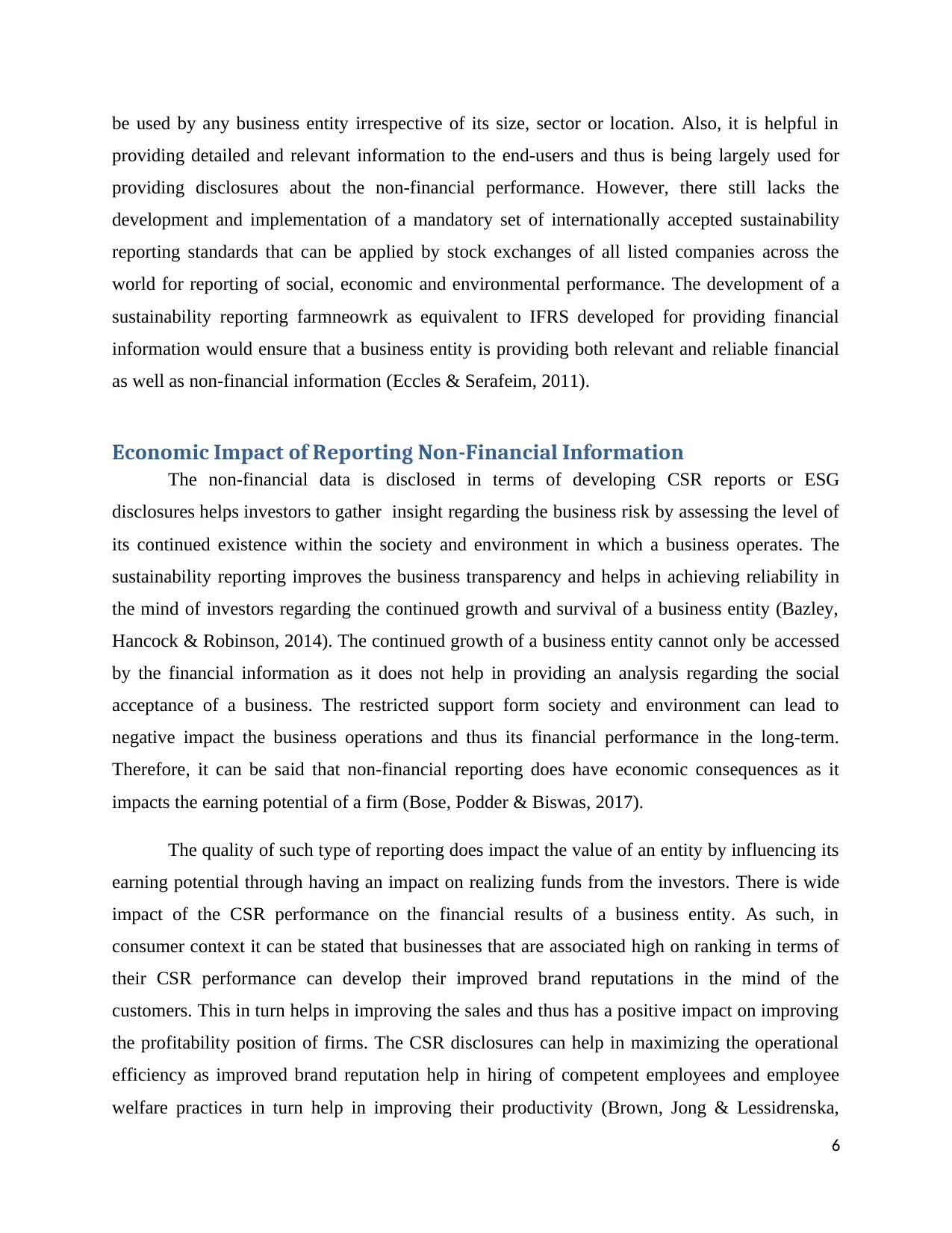
be used by any business entity irrespective of its size, sector or location. Also, it is helpful in
providing detailed and relevant information to the end-users and thus is being largely used for
providing disclosures about the non-financial performance. However, there still lacks the
development and implementation of a mandatory set of internationally accepted sustainability
reporting standards that can be applied by stock exchanges of all listed companies across the
world for reporting of social, economic and environmental performance. The development of a
sustainability reporting farmneowrk as equivalent to IFRS developed for providing financial
information would ensure that a business entity is providing both relevant and reliable financial
as well as non-financial information (Eccles & Serafeim, 2011).
Economic Impact of Reporting Non-Financial Information
The non-financial data is disclosed in terms of developing CSR reports or ESG
disclosures helps investors to gather insight regarding the business risk by assessing the level of
its continued existence within the society and environment in which a business operates. The
sustainability reporting improves the business transparency and helps in achieving reliability in
the mind of investors regarding the continued growth and survival of a business entity (Bazley,
Hancock & Robinson, 2014). The continued growth of a business entity cannot only be accessed
by the financial information as it does not help in providing an analysis regarding the social
acceptance of a business. The restricted support form society and environment can lead to
negative impact the business operations and thus its financial performance in the long-term.
Therefore, it can be said that non-financial reporting does have economic consequences as it
impacts the earning potential of a firm (Bose, Podder & Biswas, 2017).
The quality of such type of reporting does impact the value of an entity by influencing its
earning potential through having an impact on realizing funds from the investors. There is wide
impact of the CSR performance on the financial results of a business entity. As such, in
consumer context it can be stated that businesses that are associated high on ranking in terms of
their CSR performance can develop their improved brand reputations in the mind of the
customers. This in turn helps in improving the sales and thus has a positive impact on improving
the profitability position of firms. The CSR disclosures can help in maximizing the operational
efficiency as improved brand reputation help in hiring of competent employees and employee
welfare practices in turn help in improving their productivity (Brown, Jong & Lessidrenska,
6
providing detailed and relevant information to the end-users and thus is being largely used for
providing disclosures about the non-financial performance. However, there still lacks the
development and implementation of a mandatory set of internationally accepted sustainability
reporting standards that can be applied by stock exchanges of all listed companies across the
world for reporting of social, economic and environmental performance. The development of a
sustainability reporting farmneowrk as equivalent to IFRS developed for providing financial
information would ensure that a business entity is providing both relevant and reliable financial
as well as non-financial information (Eccles & Serafeim, 2011).
Economic Impact of Reporting Non-Financial Information
The non-financial data is disclosed in terms of developing CSR reports or ESG
disclosures helps investors to gather insight regarding the business risk by assessing the level of
its continued existence within the society and environment in which a business operates. The
sustainability reporting improves the business transparency and helps in achieving reliability in
the mind of investors regarding the continued growth and survival of a business entity (Bazley,
Hancock & Robinson, 2014). The continued growth of a business entity cannot only be accessed
by the financial information as it does not help in providing an analysis regarding the social
acceptance of a business. The restricted support form society and environment can lead to
negative impact the business operations and thus its financial performance in the long-term.
Therefore, it can be said that non-financial reporting does have economic consequences as it
impacts the earning potential of a firm (Bose, Podder & Biswas, 2017).
The quality of such type of reporting does impact the value of an entity by influencing its
earning potential through having an impact on realizing funds from the investors. There is wide
impact of the CSR performance on the financial results of a business entity. As such, in
consumer context it can be stated that businesses that are associated high on ranking in terms of
their CSR performance can develop their improved brand reputations in the mind of the
customers. This in turn helps in improving the sales and thus has a positive impact on improving
the profitability position of firms. The CSR disclosures can help in maximizing the operational
efficiency as improved brand reputation help in hiring of competent employees and employee
welfare practices in turn help in improving their productivity (Brown, Jong & Lessidrenska,
6
⊘ This is a preview!⊘
Do you want full access?
Subscribe today to unlock all pages.

Trusted by 1+ million students worldwide
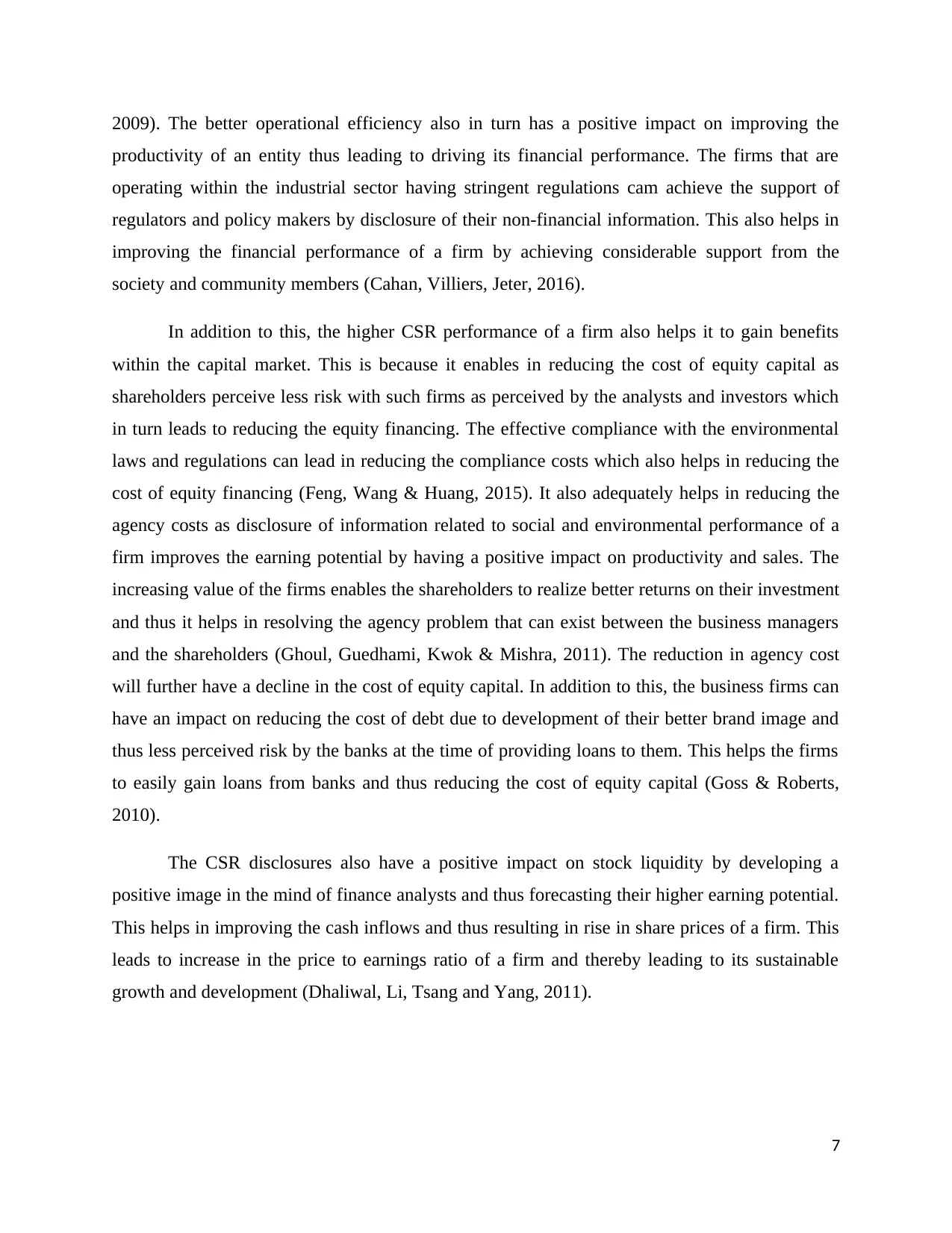
2009). The better operational efficiency also in turn has a positive impact on improving the
productivity of an entity thus leading to driving its financial performance. The firms that are
operating within the industrial sector having stringent regulations cam achieve the support of
regulators and policy makers by disclosure of their non-financial information. This also helps in
improving the financial performance of a firm by achieving considerable support from the
society and community members (Cahan, Villiers, Jeter, 2016).
In addition to this, the higher CSR performance of a firm also helps it to gain benefits
within the capital market. This is because it enables in reducing the cost of equity capital as
shareholders perceive less risk with such firms as perceived by the analysts and investors which
in turn leads to reducing the equity financing. The effective compliance with the environmental
laws and regulations can lead in reducing the compliance costs which also helps in reducing the
cost of equity financing (Feng, Wang & Huang, 2015). It also adequately helps in reducing the
agency costs as disclosure of information related to social and environmental performance of a
firm improves the earning potential by having a positive impact on productivity and sales. The
increasing value of the firms enables the shareholders to realize better returns on their investment
and thus it helps in resolving the agency problem that can exist between the business managers
and the shareholders (Ghoul, Guedhami, Kwok & Mishra, 2011). The reduction in agency cost
will further have a decline in the cost of equity capital. In addition to this, the business firms can
have an impact on reducing the cost of debt due to development of their better brand image and
thus less perceived risk by the banks at the time of providing loans to them. This helps the firms
to easily gain loans from banks and thus reducing the cost of equity capital (Goss & Roberts,
2010).
The CSR disclosures also have a positive impact on stock liquidity by developing a
positive image in the mind of finance analysts and thus forecasting their higher earning potential.
This helps in improving the cash inflows and thus resulting in rise in share prices of a firm. This
leads to increase in the price to earnings ratio of a firm and thereby leading to its sustainable
growth and development (Dhaliwal, Li, Tsang and Yang, 2011).
7
productivity of an entity thus leading to driving its financial performance. The firms that are
operating within the industrial sector having stringent regulations cam achieve the support of
regulators and policy makers by disclosure of their non-financial information. This also helps in
improving the financial performance of a firm by achieving considerable support from the
society and community members (Cahan, Villiers, Jeter, 2016).
In addition to this, the higher CSR performance of a firm also helps it to gain benefits
within the capital market. This is because it enables in reducing the cost of equity capital as
shareholders perceive less risk with such firms as perceived by the analysts and investors which
in turn leads to reducing the equity financing. The effective compliance with the environmental
laws and regulations can lead in reducing the compliance costs which also helps in reducing the
cost of equity financing (Feng, Wang & Huang, 2015). It also adequately helps in reducing the
agency costs as disclosure of information related to social and environmental performance of a
firm improves the earning potential by having a positive impact on productivity and sales. The
increasing value of the firms enables the shareholders to realize better returns on their investment
and thus it helps in resolving the agency problem that can exist between the business managers
and the shareholders (Ghoul, Guedhami, Kwok & Mishra, 2011). The reduction in agency cost
will further have a decline in the cost of equity capital. In addition to this, the business firms can
have an impact on reducing the cost of debt due to development of their better brand image and
thus less perceived risk by the banks at the time of providing loans to them. This helps the firms
to easily gain loans from banks and thus reducing the cost of equity capital (Goss & Roberts,
2010).
The CSR disclosures also have a positive impact on stock liquidity by developing a
positive image in the mind of finance analysts and thus forecasting their higher earning potential.
This helps in improving the cash inflows and thus resulting in rise in share prices of a firm. This
leads to increase in the price to earnings ratio of a firm and thereby leading to its sustainable
growth and development (Dhaliwal, Li, Tsang and Yang, 2011).
7
Paraphrase This Document
Need a fresh take? Get an instant paraphrase of this document with our AI Paraphraser
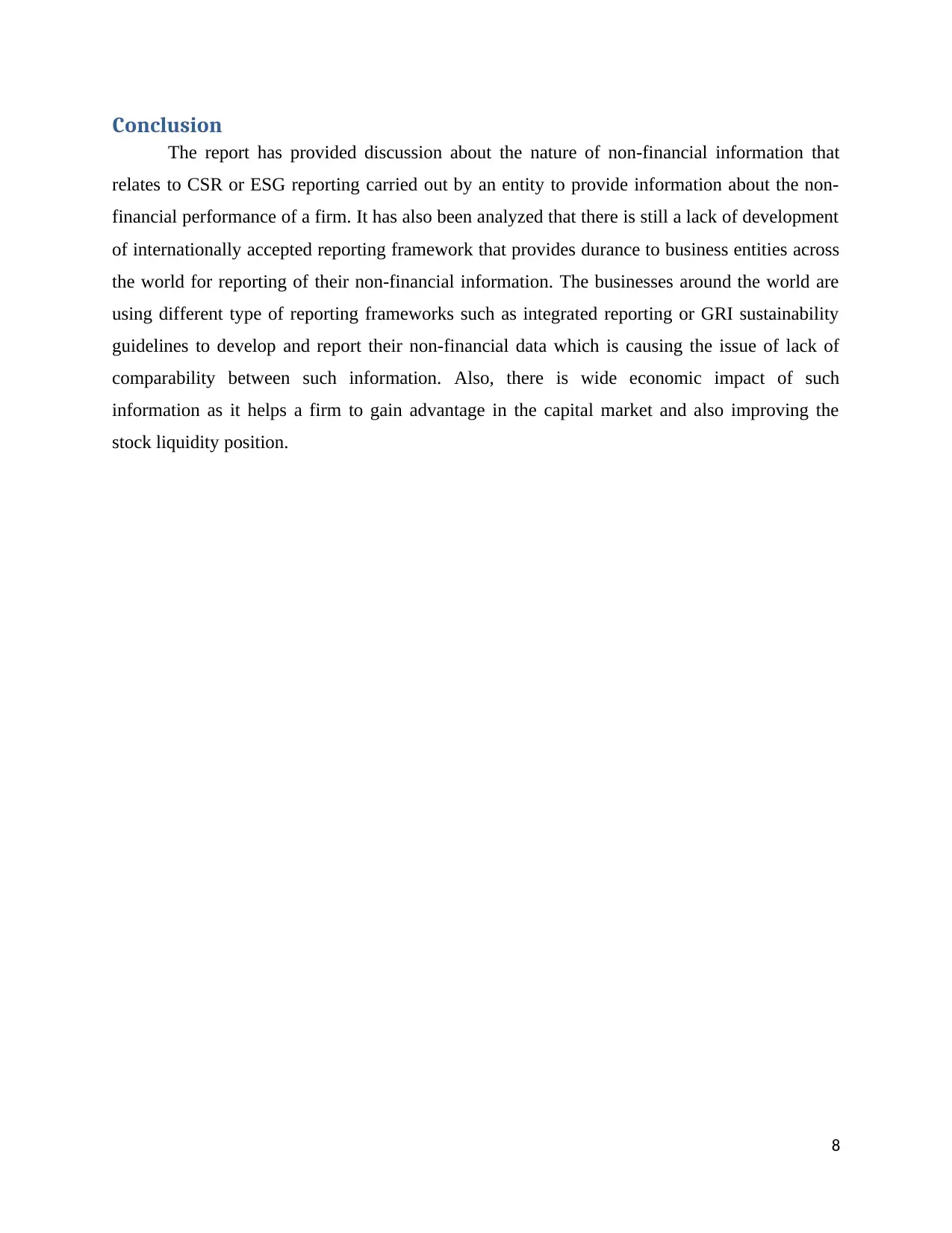
Conclusion
The report has provided discussion about the nature of non-financial information that
relates to CSR or ESG reporting carried out by an entity to provide information about the non-
financial performance of a firm. It has also been analyzed that there is still a lack of development
of internationally accepted reporting framework that provides durance to business entities across
the world for reporting of their non-financial information. The businesses around the world are
using different type of reporting frameworks such as integrated reporting or GRI sustainability
guidelines to develop and report their non-financial data which is causing the issue of lack of
comparability between such information. Also, there is wide economic impact of such
information as it helps a firm to gain advantage in the capital market and also improving the
stock liquidity position.
8
The report has provided discussion about the nature of non-financial information that
relates to CSR or ESG reporting carried out by an entity to provide information about the non-
financial performance of a firm. It has also been analyzed that there is still a lack of development
of internationally accepted reporting framework that provides durance to business entities across
the world for reporting of their non-financial information. The businesses around the world are
using different type of reporting frameworks such as integrated reporting or GRI sustainability
guidelines to develop and report their non-financial data which is causing the issue of lack of
comparability between such information. Also, there is wide economic impact of such
information as it helps a firm to gain advantage in the capital market and also improving the
stock liquidity position.
8
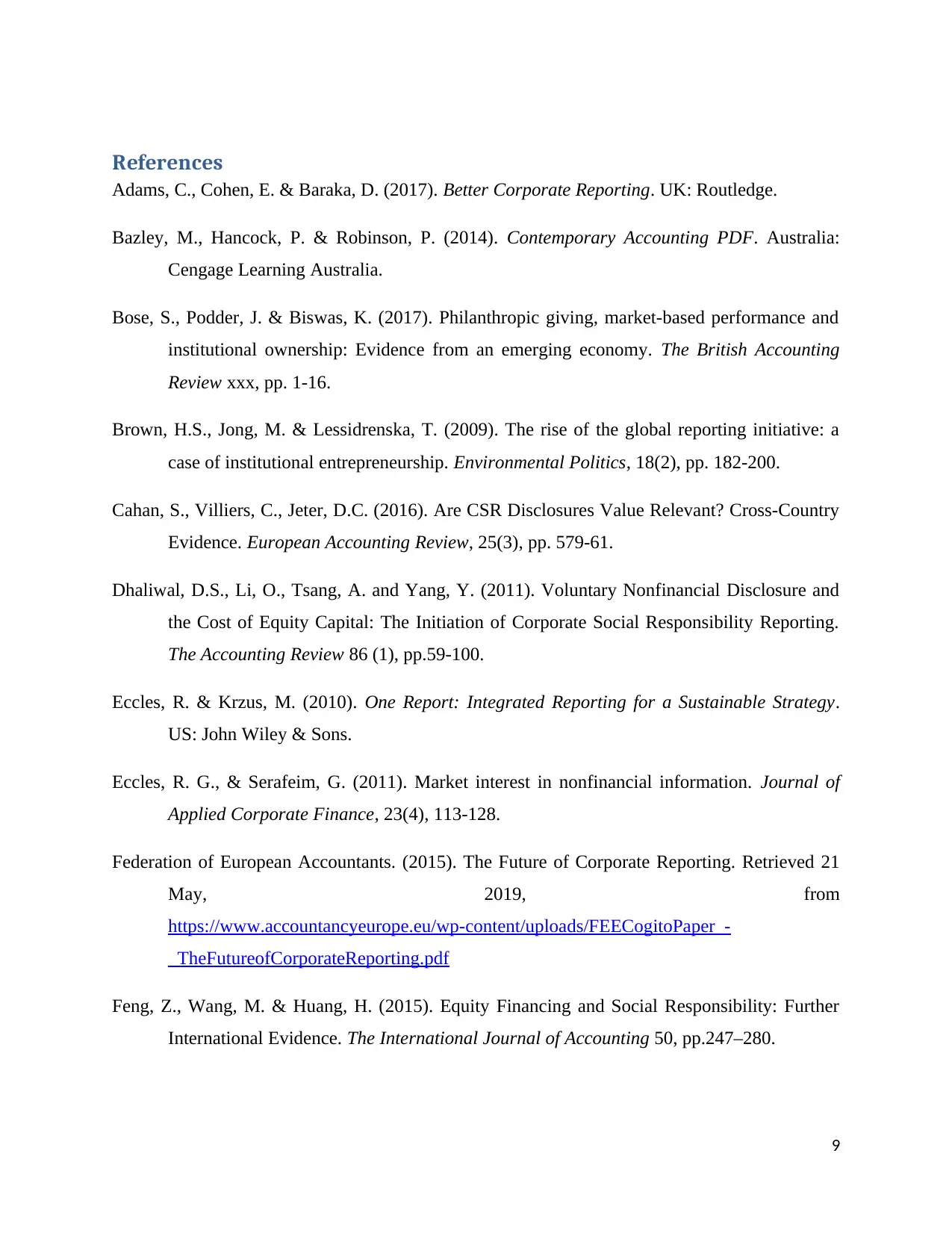
References
Adams, C., Cohen, E. & Baraka, D. (2017). Better Corporate Reporting. UK: Routledge.
Bazley, M., Hancock, P. & Robinson, P. (2014). Contemporary Accounting PDF. Australia:
Cengage Learning Australia.
Bose, S., Podder, J. & Biswas, K. (2017). Philanthropic giving, market-based performance and
institutional ownership: Evidence from an emerging economy. The British Accounting
Review xxx, pp. 1-16.
Brown, H.S., Jong, M. & Lessidrenska, T. (2009). The rise of the global reporting initiative: a
case of institutional entrepreneurship. Environmental Politics, 18(2), pp. 182-200.
Cahan, S., Villiers, C., Jeter, D.C. (2016). Are CSR Disclosures Value Relevant? Cross-Country
Evidence. European Accounting Review, 25(3), pp. 579-61.
Dhaliwal, D.S., Li, O., Tsang, A. and Yang, Y. (2011). Voluntary Nonfinancial Disclosure and
the Cost of Equity Capital: The Initiation of Corporate Social Responsibility Reporting.
The Accounting Review 86 (1), pp.59-100.
Eccles, R. & Krzus, M. (2010). One Report: Integrated Reporting for a Sustainable Strategy.
US: John Wiley & Sons.
Eccles, R. G., & Serafeim, G. (2011). Market interest in nonfinancial information. Journal of
Applied Corporate Finance, 23(4), 113-128.
Federation of European Accountants. (2015). The Future of Corporate Reporting. Retrieved 21
May, 2019, from
https://www.accountancyeurope.eu/wp-content/uploads/FEECogitoPaper_-
_TheFutureofCorporateReporting.pdf
Feng, Z., Wang, M. & Huang, H. (2015). Equity Financing and Social Responsibility: Further
International Evidence. The International Journal of Accounting 50, pp.247–280.
9
Adams, C., Cohen, E. & Baraka, D. (2017). Better Corporate Reporting. UK: Routledge.
Bazley, M., Hancock, P. & Robinson, P. (2014). Contemporary Accounting PDF. Australia:
Cengage Learning Australia.
Bose, S., Podder, J. & Biswas, K. (2017). Philanthropic giving, market-based performance and
institutional ownership: Evidence from an emerging economy. The British Accounting
Review xxx, pp. 1-16.
Brown, H.S., Jong, M. & Lessidrenska, T. (2009). The rise of the global reporting initiative: a
case of institutional entrepreneurship. Environmental Politics, 18(2), pp. 182-200.
Cahan, S., Villiers, C., Jeter, D.C. (2016). Are CSR Disclosures Value Relevant? Cross-Country
Evidence. European Accounting Review, 25(3), pp. 579-61.
Dhaliwal, D.S., Li, O., Tsang, A. and Yang, Y. (2011). Voluntary Nonfinancial Disclosure and
the Cost of Equity Capital: The Initiation of Corporate Social Responsibility Reporting.
The Accounting Review 86 (1), pp.59-100.
Eccles, R. & Krzus, M. (2010). One Report: Integrated Reporting for a Sustainable Strategy.
US: John Wiley & Sons.
Eccles, R. G., & Serafeim, G. (2011). Market interest in nonfinancial information. Journal of
Applied Corporate Finance, 23(4), 113-128.
Federation of European Accountants. (2015). The Future of Corporate Reporting. Retrieved 21
May, 2019, from
https://www.accountancyeurope.eu/wp-content/uploads/FEECogitoPaper_-
_TheFutureofCorporateReporting.pdf
Feng, Z., Wang, M. & Huang, H. (2015). Equity Financing and Social Responsibility: Further
International Evidence. The International Journal of Accounting 50, pp.247–280.
9
⊘ This is a preview!⊘
Do you want full access?
Subscribe today to unlock all pages.

Trusted by 1+ million students worldwide
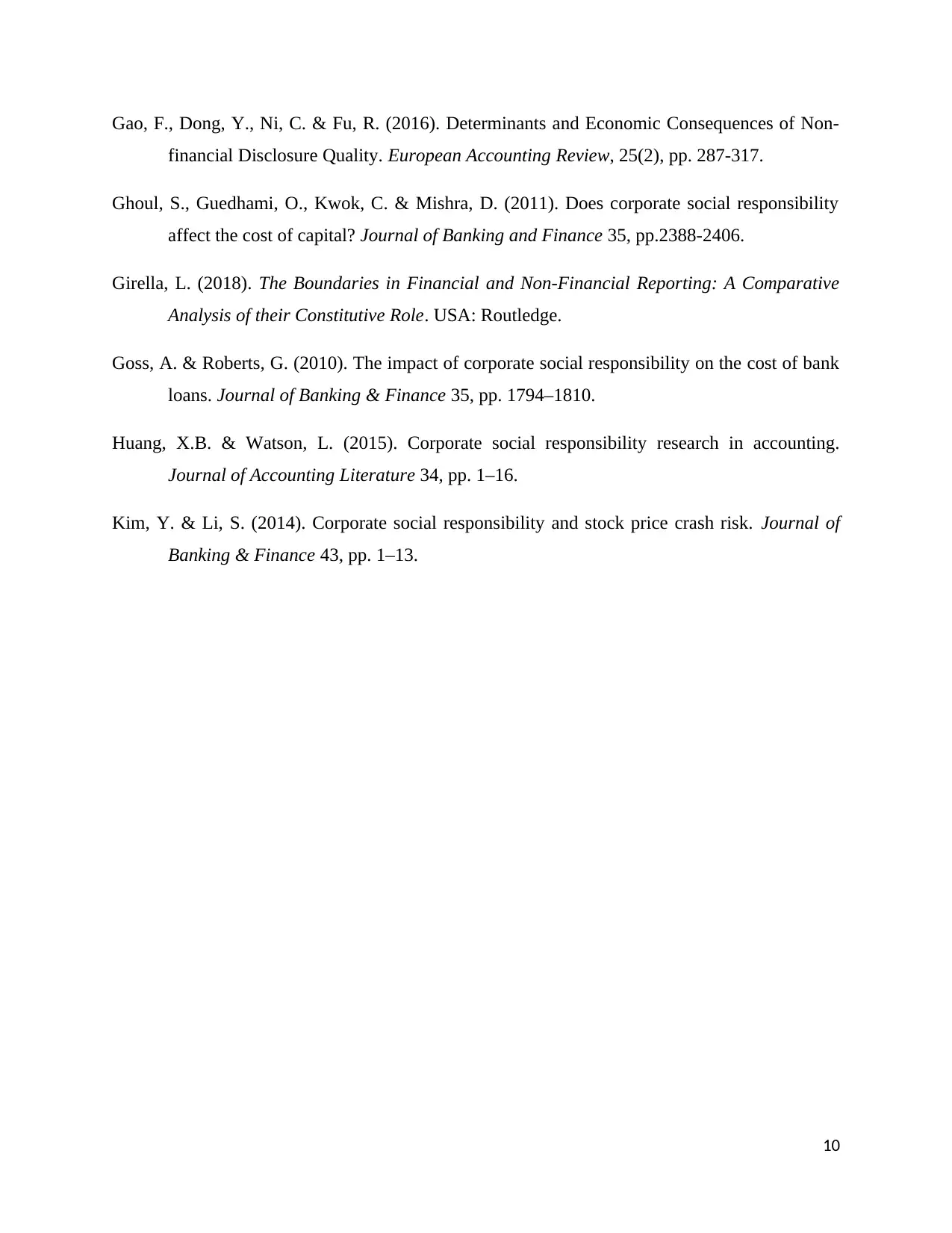
Gao, F., Dong, Y., Ni, C. & Fu, R. (2016). Determinants and Economic Consequences of Non-
financial Disclosure Quality. European Accounting Review, 25(2), pp. 287-317.
Ghoul, S., Guedhami, O., Kwok, C. & Mishra, D. (2011). Does corporate social responsibility
affect the cost of capital? Journal of Banking and Finance 35, pp.2388-2406.
Girella, L. (2018). The Boundaries in Financial and Non-Financial Reporting: A Comparative
Analysis of their Constitutive Role. USA: Routledge.
Goss, A. & Roberts, G. (2010). The impact of corporate social responsibility on the cost of bank
loans. Journal of Banking & Finance 35, pp. 1794–1810.
Huang, X.B. & Watson, L. (2015). Corporate social responsibility research in accounting.
Journal of Accounting Literature 34, pp. 1–16.
Kim, Y. & Li, S. (2014). Corporate social responsibility and stock price crash risk. Journal of
Banking & Finance 43, pp. 1–13.
10
financial Disclosure Quality. European Accounting Review, 25(2), pp. 287-317.
Ghoul, S., Guedhami, O., Kwok, C. & Mishra, D. (2011). Does corporate social responsibility
affect the cost of capital? Journal of Banking and Finance 35, pp.2388-2406.
Girella, L. (2018). The Boundaries in Financial and Non-Financial Reporting: A Comparative
Analysis of their Constitutive Role. USA: Routledge.
Goss, A. & Roberts, G. (2010). The impact of corporate social responsibility on the cost of bank
loans. Journal of Banking & Finance 35, pp. 1794–1810.
Huang, X.B. & Watson, L. (2015). Corporate social responsibility research in accounting.
Journal of Accounting Literature 34, pp. 1–16.
Kim, Y. & Li, S. (2014). Corporate social responsibility and stock price crash risk. Journal of
Banking & Finance 43, pp. 1–13.
10
Paraphrase This Document
Need a fresh take? Get an instant paraphrase of this document with our AI Paraphraser

11
1 out of 11
Related Documents
Your All-in-One AI-Powered Toolkit for Academic Success.
+13062052269
info@desklib.com
Available 24*7 on WhatsApp / Email
![[object Object]](/_next/static/media/star-bottom.7253800d.svg)
Unlock your academic potential
Copyright © 2020–2026 A2Z Services. All Rights Reserved. Developed and managed by ZUCOL.



